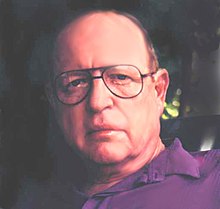Uri Milstein
Uri Milstein ( Hebrew אורי מילשטיין; Born February 29, 1940 in Tel Aviv ) is an Israeli military historian and writer. He represents historical revisionist theses.
Life
Milstein was born in Tel Aviv in 1940 as the son of Russian immigrants . His parents were involved in the construction of the Afikim kibbutz on the Jordan Rift in the 1930s . The father served as a volunteer in the British Army during World War II ; the mother was a teacher. After graduating from high school in Tel Aviv, Milstein joined the Israel Defense Forces in 1958 . He served in the command unit Battalion 890 of the paratrooper brigade , for which he later worked as a military historian, and took on as a medic a . a. in the Six Day War (1967) and the Yom Kippur War (1973). After his criticism of the Battle Of Chinese Farm in 1974, he was released from his job. In reserve service, he then worked as a military historian for the Israeli Air Force .
From 1960 he studied economics at the Hebrew University of Jerusalem . After completing his Masters in Philosophy , he earned a Ph.D. in political science and since then has been researching topics in military theory and history. In the 1980s, he taught military history at the IDF Command and Staff College in Glilot and from 1989 to 1993 he was a visiting professor of military theory at the Bar-Ilan University in Ramat Gan, where the Rabin assassin 1995 Yigal Amir was one of his students . Further teaching activities led him a. a. to the Israeli University Center Ariel in Samaria (West Bank).
Milstein is married to an actress and has two children. He lives in Seattle , Washington. His siblings are university professors in genetics and Islamic art in Israel. His ancestors include a. the Hebrew poet and Zionist Rachel . He edited several works by his great aunt.
Military historical work
Milstein published several articles (including in Haaretz ) and writings on Israeli military history. He wrote a landmark and multi-volume work on the Israeli War of Independence in the 1940s, published by the University Press of America , which was also picked up by the American news magazine Time . Despite his acquired reputation, many of his writings and the theses represented in them, including those on the paramilitary underground organization Palmach and the biography of Yitzchak Rabin , are controversial among the Israeli public and the military. He is also considered to be one of the few Israeli representatives of the now refuted historical revisionist preventive war thesis on World War II.
He is close to the conservative party alliance Likud and maintained close relations with the former General and Prime Minister Ariel Sharon . One of his opponents is the military historian Meir Pa'il .
Awards
- 2007: Jabotinsky Prize for Blood Libel at Deir Yassin: The Black Book
Fonts (selection)
Milstein published over 30 books in Hebrew, which were also translated into English:
- History of Israel's War of Independence . 4 volumes, translated and edited by Alan Sacks, University Press of America, Lanham u. a. 1996 ff.
- Volume 1: A Nation Girds For War , 1996, ISBN 0-7618-0372-6
- Volume 2: The First Month , 1997, ISBN 0-7618-0721-7
- Volume 3: The First Invasion , 1998, ISBN 0-7618-0769-1
- Volume 4: Out of Crisis Came Decision , 1999, ISBN 0-7618-1489-2
- with Arie Amit (Tepper): The Rabin File: An Unauthorized Expose . Gefen Publishing House, Jerusalem / New York 2000, ISBN 965-229-196-X .
- The Birth of a Palestinian Nation: The Myth of the Deir Yassin Massacre . Translated by Yonatan Silverman, Gefen Publishing House, Jerusalem / New York 2012, ISBN 978-965-229-582-8 .
Web links
- Search for "Uri Milstein" in the SPK digital portal of the Prussian Cultural Heritage Foundation
- Uri Milstein's website
- Uri Milstein at Gefen Publishing House
Individual evidence
- ↑ Elie Knaufer: Ex-Bar-Ilan professor: I may have helped kill Rabin . jweekly.com, November 24, 1995.
- ↑ Gad Nashon: Dr. Uri Milstein: Israel's most cherished and hated revisionist military historian . jewishpost.com, accessed June 20, 2014.
| personal data | |
|---|---|
| SURNAME | Milstein, Uri |
| ALTERNATIVE NAMES | אורי מילשטיין (Hebrew) |
| BRIEF DESCRIPTION | Israeli military historian and writer |
| DATE OF BIRTH | February 29, 1940 |
| PLACE OF BIRTH | Tel Aviv |
